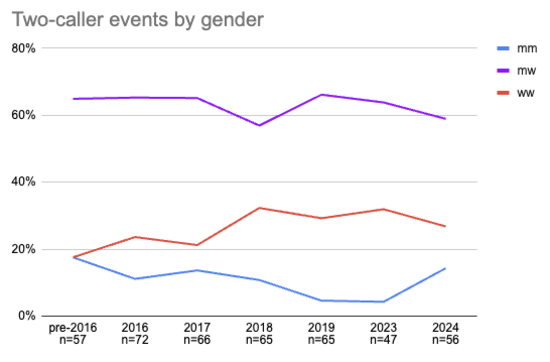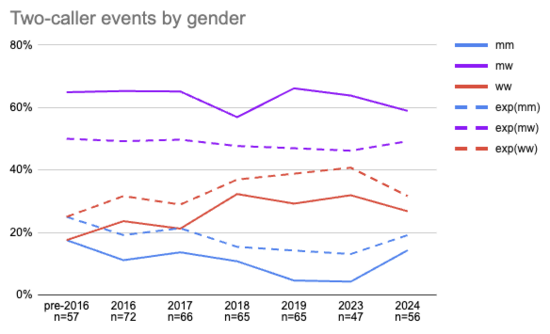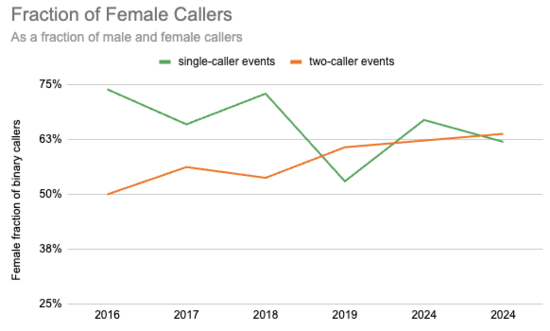Contra Caller Gender III |
May 15th, 2024 |
| contra, gender |
To see the effect most clearly, I looked at events with two binary callers. [1] Here's what I saw:
You can see that events with one female and one male caller are the most common, but you'd also expect this even if bookers were selecting both slots independently because there are two ways to get a male-female pair and only one way each to get a male-male or female-female pair. What we can do, however, is generate another set of lines representing the expected number in each category if bookers were selecting independently:
The idea is that if, say, 40% of slots went to men than you'd normally expect to see two men 16% (40% * 40%) of the time, two women 36% (60% * 60%) of the time, and one of each 48% (40% * 60% + 60% * 40%) of the time. That we see one of each 63% of the time for 2026-2024 instead of 48% tells us that about some bookers are gender-balancing callers.
What these statistics don't tell us, however, is the gender distribution we would get if bookers didn't consider this as a factor. You could think that this factor leads to fewer women being booked (because bookers are avoiding booking two women and there are more female callers) or that this leads to fewer men being booked (because booking two male callers looks regressive). One way to try to get at this would be to look at events with only one caller. While they might try to balance over years, I would at least expect the effect to be smaller? Here's what I see:
(Note that I don't have this data for before 2016)
It seems to me that at the beginning of this period the booking preference for gender balance was leading to fewer female callers at two-caller events, since single caller events were much more likely to book a female caller. More recently, however, these have converged, which I think means that, under the assumption that single-caller events reflect the uninfluenced ratio of male to female callers, the preference for gender balance is affecting which gigs men and women get but isn't affecting how many?
I was curious whether this phenomenon was primarily driven by a subset of events, and tried looking to see if there were events that only booked male-female pairs. I only found five events in this category with at least four years of data, however, which is about as many as you'd expect by chance. I think this tells us that to the extent that bookers have this preference it's not their only consideration, which isn't very surprising. I don't think there are enough observations to say anything more specific than the general preference for balance, because we have relatively few booking records by many events.
[1] I don't know how everyone identifies, so I've done the best I
could. Most of this is by first name, with searches on "[caller]
contra" to look for pronouns in tricky cases.
Comment via: facebook, lesswrong, mastodon, substack


